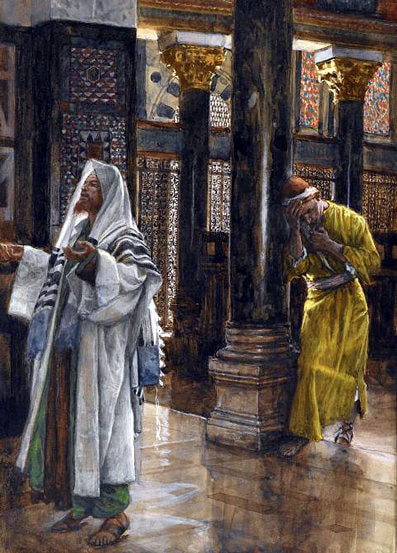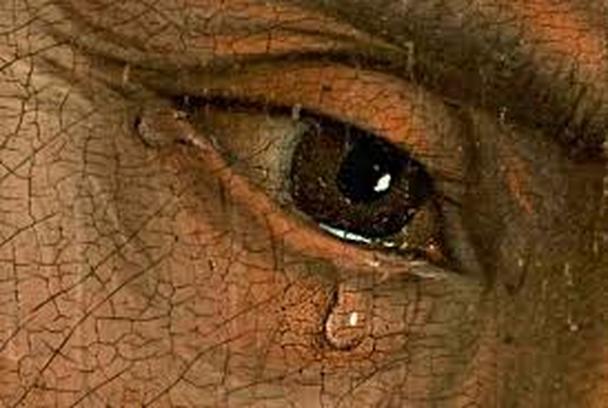"Two men went up into the temple to pray, one a Pharisee and the other a tax collector." Now we've heard this parable so many times and we've heard of Jesus' run-ins with the Pharisees, so we might get the wrong idea. When we hear the word Pharisee we think "bad guy." There is nothing worse than being a Pharisee. It's practically a cuss word in Christian circles. And some go to great lengths to prove that they are not Pharisees, even deliberately sinning! But Jesus didn't choose a Pharisee, because Pharisees are known bad guys. Rather, he chose a Pharisee, because they were known to be good guys. Everyone who first heard Jesus tell this parable thought that the Pharisee was the good guy. The tax collector on the other hand was certainly the bad guy, a cheat, a Benedict Arnold, an enemy of God and his people! So, it came as a greater shock that the tax collector rather than the Pharisee went down to his house justified than that the tortoise beat the hare in a race.
Why is this such a shock? What does it mean to be justified? To be justified means to be declared righteous by God. Jesus told this parable to some who trusted in themselves that they were righteous. To be righteous means to be in a right relationship with God. It means that God is pleased with you and accepts you and will welcome you into heaven. The Pharisee thought that God was pleased with him and would welcome him into heaven, because his works were so good. Everyone thought that God would declare the Pharisee righteous! Just look at how well he follows God's Law! But God is not pleased with the Pharisee's works. He doesn't declare him righteous. This is a shock! And so God shows us that none of our works can make us righteous before God.
Many take this the wrong way. They assume because God wasn't pleased with the Pharisee that the works he bragged about are all rotten. But this isn't true. The Pharisee thanked God. Isn't this what we are all commanded to do; pray, praise, and give thanks? Is it not wicked to be an extortioner; to steal other people's money? God certainly is not pleased with adultery, but forbids it in all its forms. Fasting is certainly fine outward training, as we learn in our Small Catechism. And giving a tenth of all that you earn to the Lord is not only commanded by God to Israel, but it is the example of the Patriarchs, Abraham and Jacob. If every Christian trusted in God enough to give a tenth of all they made to the Lord, congregations would be less burdened and could more easily focus on missions to spread God's righteous wealth throughout the world! We should all strive to do as the Pharisee says. So, why was God not pleased?
God was not pleased, because the Pharisee trusted in himself. He thought that his works would earn him favor with God. In fact, he trusted in his works instead of God. And by so doing he proved his righteousness to be a mere façade, while he was still rotten on the inside. The Pharisee prayed, "God, I thank you that I am not like other men," which could actually be turned into a good prayer. We should all thank God that we are not unrepentant, faithless, sinners. The only reason any one of us doesn't steal or commit adultery or behave in any unjust way is by the grace of God. Thank God that he has spared me of such wicked sins. If it were not by his grace I certainly would be the worst of the worst sinners, an unbeliever and a blasphemer (1 Cor. 15:10). But the Pharisee is not thanking God for rescuing him from sin and unbelief. He is using his prayer as a pretense, so he can brag and claim to be better than others.
The Pharisee was not humble. He was godlike in his own eyes. He didn't repent of his sins. He didn't ask God for mercy. He actually thought that by a few outward acts he had fulfilled the entire Law and earned God's friendship. But the Pharisee was far from the mark. Every one of his good works were riddled with selfish ambition. And he showed the true condition of his heart by his hatred of his neighbor, the tax collector. You cannot love God and hate your brother. The second table of the law is summed up, "Love your neighbor as yourself." If you do not love your neighbor, all your good works are worthless.
You are not righteous before God by being better than others. And you cannot make yourself righteous by following a set of rules. If you fail at one point of the law, even in secret, even in the privacy of your heart, then you are not righteous before God.
The tax collector was a sinner, no doubt. Tax collectors had the reputation of being disloyal; they worked for the occupying Roman government. They were often greedy thieves; collecting more than they were authorized. By all accounts this tax collector was unrighteous.
But the tax collector doesn't give a defense. He doesn't list off the good things he's done. He offers nothing to God at all. Rather, he stands far off, he beats his breast, and he says, "God, be merciful to me, the sinner."
The word the tax collector uses for "mercy" is not the same word we usually hear in the New Testament. Usually mercy means simply to show pity. But the word the tax collector uses here means, "be propitiated." You can see why the translators chose the word "mercy" instead. Who knows what it means to be propitiated? But to understand this parable, it's important for us to understand what it means to be propitiated. For God to be propitiated means that God is appeased, he is no longer angry, rather he is satisfied. For God to be propitiated debt has to be paid, a wrong has to be amended, atonement must be made. This is important, because the tax collector isn't simply throwing a Hail Mary, hoping that God will have pity. He is praying that God will accept the sacrifice of atonement on his behalf and forgive him his sin for the sake of the sacrifice.
The tax collector stood far off and prayed, "God be propitiated to me, the sinner." Unlike the Pharisee, he didn't want to be seen by anybody. He didn't raise his voice or even look up to heaven, but beat his breast away from the crowd. He didn't want to be seen by anyone, but God. You might wonder, then why he went to the temple? Why didn't he just stay home and pray in his room?
It's not a coincidence that the Pharisee and the tax collector went to the temple at the same time to pray. Every morning and afternoon the priest would sacrifice a lamb to atone for the sins of the people and offer incense. These were also the times of public prayer, when the people would gather and pray after the priest offered the sacrifice of atonement, while he was burning the incense.
The tax collector went to the temple, because he believed God's promise. He believed that God would be where he promised to be. He believed that God would accept the sacrifice. Every sacrifice offered to God in the temple pointed to Christ, who would be sacrificed to atone for the sins of the whole world. This is why the tax collector went to the temple. This is why he used the word, "propitiate" instead of just mercy. He was saying to God, "I believe your promise. I believe that this sacrifice of atonement pleases you. For the sake of this sacrifice, forgive me. This sacrifice pleases you, so be pleased with me!"
And here we see the Pharisee's greatest sin. He was so proud of himself and his own righteousness, he forgot the reason they were gathering in the temple in the first place: the sacrifice of atonement. He ignored the sacrifice. He didn't think he needed it. He thought his congratulatory "prayer" was greater than the sacrifice for his sins.
The tax collector on the other hand beat his breast mourning over his sin. That's what the crowd did after Jesus died on the cross, they beat their breasts in horror for what they had done (Luke 23:48). It is as if the tax collector sees the lamb slain and he knows that this points to the Christ, who would shed his blood for him. And the tax collector becomes the only sinner in the world. He is to blame for God's anger and for the punishment of his own Son. It is as we sing in Lent, "Whence come these sorrows, whence this mortal anguish? It is my sins for which Thou, Lord, must languish; Yea, all the wrath, the woe, Thou dost inherit, This I do merit." (LSB 439, stz. 4).
The tax collector did not claim any good works of his own. Rather, he clung to God's promise in the sacrifice alone. This is the only way anyone can be saved. Only the atoning sacrifice of God's Son can make you righteous. No matter how good you think you are, even if your works are greater than the Pharisee's, they will not justify you before God. But likewise, no matter how terrible a sinner you are, if your sins make the tax collector look like a saint, the atoning blood of Jesus still propitiates God and justifies you. St. John writes, "If anyone does sin, we have an advocate with the Father, Jesus Christ the righteous. He is the propitiation for our sins, and not our sins only but also for the sins of the whole world." (1 John 2:1b-2)
The tax collector humbled himself, because he had faith in God's promise. He knew that he had nothing to offer God that could make him righteous. Rather, he trusted in the free gift of forgiveness offered through the sacrifice. We have the same faith. We trust in the sacrifice of Christ Jesus. He died for our sins in accordance with the Scriptures. He was buried and was raised on the third day, in accordance with the Scriptures. Every sacrifice in the temple pointed to Jesus' sacrifice on the cross. When we pray to God for mercy, we pray that God would credit Christ's death to us. We pray that as Jesus died for the sins of the whole world that our sins too would be washed away in his blood. We humble ourselves by receiving God's forgiveness and righteousness as a free gift, just as the tax collector did. And we are exalted, just as the tax collector was justified before God.
The temple is no more. Christ's sacrifice put an end to all atoning sacrifices. Yet we can still go to where God promises to be. We can go to where God feeds us the fruit of Jesus' atoning sacrifice. This morning we humble ourselves before our God and God applies to us the benefit of Jesus' death. We even eat the body slain and drink the blood poured out, which propitiates God to us. We see, hear, and taste that God is propitiated to us. And having in humble faith received God's forgiveness and benediction each one of us returns to our house justified. Amen.




 RSS Feed
RSS Feed